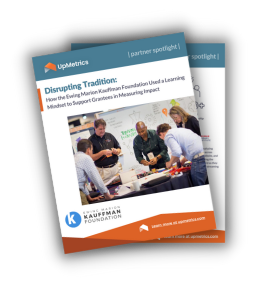Grantmaking Decisions Need to Be More Data-Driven - Here's Why
As philanthropic efforts expand across diverse sectors, grantmakers face increasing pressure to be both impactful and accountable.
Traditionally, funding decisions have been guided by intuition, reputation, and relationships. However, with growing demands for transparency and measurable results, and given the evolving needs of grantees and communities, decision-making must now incorporate something more powerful: data.
Let’s explore why data-driven decisions are becoming essential in grantmaking and how embracing this approach can optimize resource allocation, foster accountability, and amplify the likelihood of creating meaningful, measurable change in communities served.
1. Better Resource Allocation for Maximum Impact
Key Takeaway: Data-driven insights allow grantmakers to see where funds are most needed and which projects are likely to yield the greatest benefits.
Rather than distributing funds across a wide array of projects, grantmakers can focus on those with proven success rates and measurable outcomes. With the right data in hand, foundations can:
- Understand community needs more comprehensively, using demographic, economic, and social data.
- Spot gaps in funding and target areas that are historically underfunded or lack resources.
- Avoid redundant funding by using data to identify projects already being supported by other organizations.
This shift enables organizations to prioritize initiatives that yield the greatest social good, ensuring every dollar is strategically placed, reducing waste and maximizing the return on their investments in social impact.
2. Increasing Transparency and Accountability
Key Takeaway: With data-backed decisions, funders can provide transparency around how and why funding decisions were made, while setting measurable goals that create accountability and enable evaluation towards better outcomes.
When funding decisions are based on concrete data, foundations can set clear expectations for outcomes and monitor progress more effectively. By leveraging data, grantmakers can:
- Define and track key impact indicators (KPIs) for each grant.
- Measure grantee success against specific goals, creating transparency and accountability for everyone involved.
- Evaluate past initiatives to identify what approaches are working and where adjustments are needed.
Data-driven strategies not only make it easier to assess grantee performance but also ensure that grantmakers are accountable to their stakeholders. Donors, community leaders, and the public increasingly demand transparency from grantmakers, wanting to see that funds are being used effectively.
By using data, grantmakers can clearly demonstrate the rationale behind their decisions, explaining why certain projects were selected and others were not. This transparency not only strengthens relationships with funders and recipients but also encourages a culture of openness that can benefit the entire philanthropic sector.
3. Responding Promptly to Community Needs
Key Takeaway: Another advantage of data-driven grantmaking is the ability to adapt to changing needs. Data offers real-time insights into community trends, allowing organizations to respond promptly and adjust their strategies when necessary.
For instance, if data indicates an emerging crisis in a specific area, funds can be reallocated swiftly to address that need. This adaptability ensures that grants are not only based on past performance but also aligned with current needs, allowing philanthropic efforts to remain relevant and responsive.
Additionally, data-driven frameworks can reduce human biases in decision-making. By focusing on objective, measurable outcomes, grantmakers can promote more equitable distributions, ensuring underrepresented groups and communities receive fair consideration. Funding decisions can then be based on real community needs rather than subjective factors, leveling the playing field for diverse applicants.
4. Enhancing Philanthropic Collaboration
Key Takeaway: Data-driven approaches can enhance collaboration among grantmakers and other grantees.
When organizations share data on successful initiatives and community needs, they can work together more effectively to avoid redundancies and cover more ground. For example, if several foundations are funding similar projects, sharing data can reveal opportunities to pool resources or adjust strategies for broader impact. In this way, data-driven collaboration reduces inefficiencies and amplifies the positive effects of grantmaking across communities.
Data also creates a more effective and streamlined relationship between funders and grantees. Trust-based, collaborative relationships that encourage knowledge sharing and transparency are the key to tackling today's complex challenges in our local communities and worldwide.
5. Strengthening Data Governance for Long-Term Benefits
Key Takeaway: An effective data governance strategy is vital to harnessing the full power of data in grantmaking.
It's important to have a structured approach to managing and safeguarding data, which includes defining ownership, setting access controls, and maintaining quality assurance. With robust data governance, grantmakers can confidently navigate large data sets, making information accessible, reliable, and secure, and establishing a foundation for sustainable, long-term impact.
6. Supporting Continuous Improvement and Learning
Key Takeaway: A data-centered approach enables grantmakers to assess past initiatives and continuously refine their strategies.
By analyzing previous outcomes, organizations can learn from their successes and failures, using this knowledge to inform future decisions. With consistent data collection, they can spot trends, identify areas for improvement, and adapt to changing needs over time, creating a responsive, adaptive grantmaking environment.
Efficient data use also speeds up grantmaking by reducing administrative burdens and cutting down redundant processes. By employing data-driven tools for applications, tracking, and reporting, grantmakers can allocate more time to analyzing potential outcomes rather than managing paperwork.

Conclusion: Data is not just a "nice to have" in modern grantmaking—it’s a critical and transformative tool that enhances every stage of the funding lifecycle.
While integrating data into grantmaking requires an initial investment of time and resources, the payoff is undeniable. Foundations equipped with data-driven insights can make informed, impactful choices that create lasting, positive outcomes in the communities they serve. For grantmakers looking to amplify their impact, adopting a data-driven approach isn’t just a recommendation—it’s the future of effective philanthropy.
By using tools and platforms designed for data collection, analysis, and reporting, grantmakers can not only enhance their decision-making capabilities but also ensure that each grant they make contributes to meaningful, measurable change. The time to leverage data in grantmaking has arrived, and those who embrace this shift will be best positioned to drive impact where it’s needed most.

October 31, 2024


